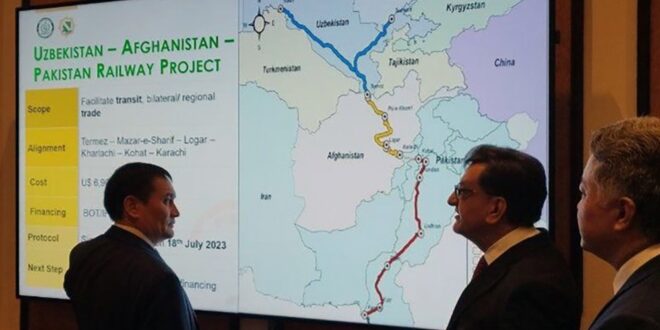Uzbekistan, Afghanistan and Pakistan estimate the cost of construction of the Trans-Afghan railway at almost $7 billion, Kun.uz News Agency reported on Thursday.
Recently, the head of the Ministry of Transport, Ilkhom Mahkamov, held negotiations in Pakistan with local industry departments and large transport and logistics companies NLC-Logistics and TCS, the agency added.
The Uzbekistan-Afghanistan-Pakistan railway construction project can be implemented through a PPP in the Build-Operate-Transfer format.
The parties also agreed to develop multimodal transportation along the Trans-Afghan corridor, reduce transportation fees, simplify cargo transportation and speed up the construction of a railway through Afghanistan.
The Trans-Afghan Highway initiative was launched in 2018. At that time, the project with an annual transportation potential of 20 million tons of cargo was estimated at $5 billion.
Based on Kun.uz news agency report in July 2022, Uzbekistan Railways shared “Boshtransloyikha” calculations. The institute put the estimated cost of building the railway at $4.6 billion, and the project will take 5 years to complete.
Last December, Pakistan estimated the construction of the railway between Pakistan and Uzbekistan at $8.2 billion.
This comes after a trilateral trade meeting between Afghanistan, Pakistan and Uzbekistan was held in Islamabad on Tuesday and the participants emphasized the need to strengthen economic relations between the three countries.
The meeting was attended by Nuruddin Azizi, Acting Minister of Industry and Commerce of Afghanistan, Gohar Ejaz, Minister of Commerce of Pakistan, and Jamshid Khodjaev Abdukhakomovich, Deputy Prime Minister of Uzbekistan.
The Afghan Embassy in Islamabad said that discussions centered around advancing the trans-Afghan railway project, trilateral transit and trade, challenges to regional connectivity and other matters.
The minutes of the meeting, which was signed between these countries, focused on strengthening trilateral economic relations and regional connectivity through trade development, more transit facilities, increasing joint investments, reducing costs, transportation facilities, digitalization of customs systems, strengthening and expanding the banking system, food security, issuing visas, and also solving transit problems and strengthening trilateral transit.
“This is a significant step towards strengthening of economic ties and regional connectivity. Bright prospects for trade, investment, and connectivity lie ahead for mutual benefit of three countries,” Gohar Ejaz, the Minister of Commerce of Pakistan, said on X.
 Eurasia Press & News
Eurasia Press & News




